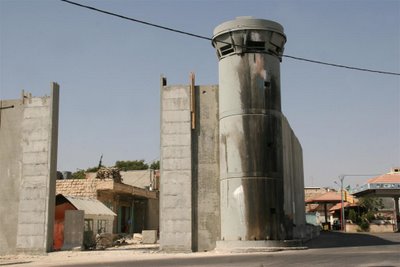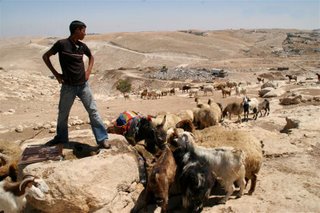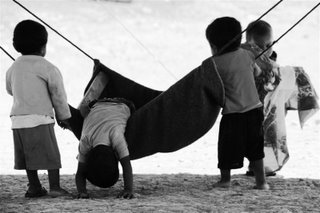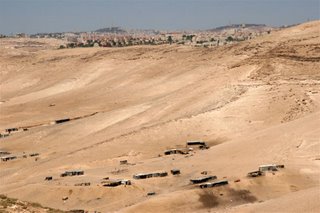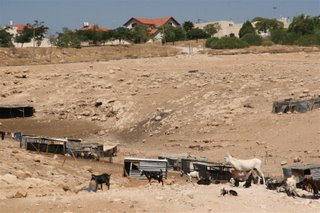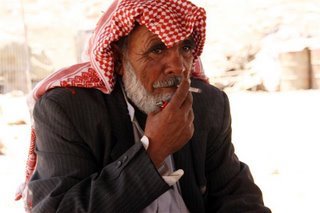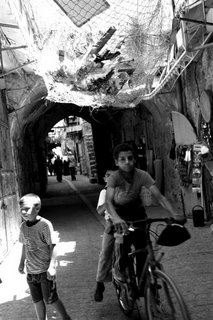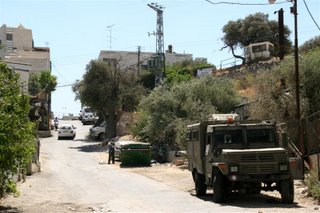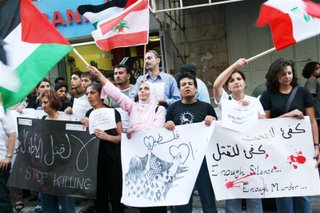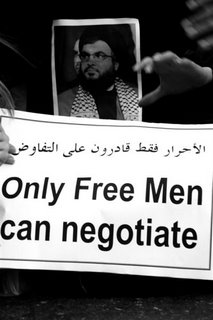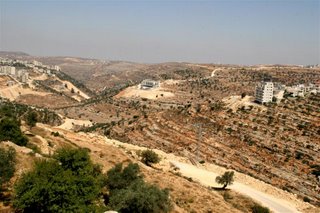Vendredi 18 aout.
Voila deja une semaine que je suis la. Une semaine encore de sentiments meles. A la fois contente d etre ici, il y a desormais quelque chose de familier pour moi. Mais aussi frustree de retrouver l’occupation et ses paradoxes, les soldats qui ne savent pas ce qui font, et jouent de leurs petits pouvoirs, la violence, la deshumanisation, le Mur et le reste.
Mes contradictions aussi. je m’interroge sur mon rôle ici. Sur le sens de ma presence, de mes actions, de mes paroles. La vie à Ramallah peut etre tres confortable. Je n’ai pas besoin de beaucoup d’argent, il y a des cafes, des restaurants ; des films, des magasins où on peut trouver de tout. La question morale est : qu’est ce que je peux faire pour changer les choses ? temoigner, ecrire, construire une base de donnees de milliers de photos…mais pour quoi ? pour qui ? Intervenir sur le terrain, écrire les rapports, continuer à y croire ? Est-ce que ces armes sont efficaces ? se battre » pour que des projets culturels continuent à éclore, comme le travail que j’ai fait avec ces enfants dans le camp de refugies de Aida ?
Tous les jours, surtout quand nous voyageons nous sommes face à des situations où nous pouvons intervenir ; où nous devons faire des choix. Lors de mon retour de Naplouse, un checkpoint etait fermé. Devais-je aller parler aux soldats ? Un Palestinien a essayé, il s’est fait pointer une arme sur lui et le soldat a tiré au dessus de lui.
Autre histoire pour illustrer mes dilemmes. Je vais à Hebron, appelé Khalil par les Palestiniens, avec un de mes anciens professeurs. J’avais l’intention de visiter la famille Haekel qui habite juste à côté de la colonie Tel Rumeida et de plusieurs installations militaires. Leur vie leur est devenue infernale et pourtant ils restent. L’année derniere, le patriarche de la famille est mort et j’avais promis à sa fille que j’amènerais une photo de lui que j’avais pris quand j’etais restee avec eux une nuit. L’acces est difficile, il y a un checkpoint en bas de leur rue. Pour se rendre chez eux, il nous faut longer la colonie. Le soldat nous arrête tout de suite et sans plus nous donner d’explication nous explique que nous ne pouvons pas nous y rendre. Nous expliquons que nous connaissons cette famille et que nous voulons juste prendre un café. Le travailleur d’une organisation israélienne qui nous accompagne essaye de négocier en vain et explique au soldat qu’il a visité la famille de nombreuses fois sans aucun probleme.
Le soldat nous repond que la famille peut bien descendre nous voir. Nous refusons bien sur. Nous demandons à parler au superieur, en vain aussi. il nous dit que l’officier, à qui il a parlé il y a meme pas 5 minutes n’est pas disponible. Bizarre bizarre. Alors que faire ? Je sais que nous pouvons passer par l’arrière pour rejoindre la maison ; un gamin palestinien nous montre le chemin. Mais bien evidemment un soldat est posté là. Il est entouré de 5/6 chiens sauvages qui n’ont pas l’air tres amicaux. Il nous crie dessus. Notre ami de Btselem s’avance. Le soldat le fait passer au dessus des fils barbelés ; et il manque de tomber. Il nous demande d’approcher aussi et nous fait signe d’une manière agressive de nous poster sous un arbre. Il nous prend nos passeports et nous déclare qu’il appelle la police pour enquêter sur le cas. Quel cas ? des internationaux qui souhaitent aller prendre un café chez une famille palestinienne !
Le soldat nous dit de le suivre. Nous descendons et nous nous retrouvons face au soldat qui ne voulait pas nous laisser passer au premier checkpoint. Il devient tres aggressif- « vous avez voulu me berner ?!! », hurle-t-il en anglais. La police nous attend ; nous laissons l’employé de Btselem parler. Apres quelques minutes nos passeports nous sont rendus et la police s’en va. Des activistes de l’ISM ; le mouvement de solidarité internationale, viennent nous voir. Ils nous confirment qu’ils se rendent regulièrement chez la famille Haekel en passant par derrière. Et le soldat et les chiens alors ? Il faut les ignorer ; nous dit-on. La police et l’armée veulent juste nous intimider mais ne peuvent pas vous arrêter. On nous propose de nous raccompagner voir la famille. Mais apres l’incident avec la police nous ne sommes pas tres partants. Je suis furieuse de ne pas avoir vu la famille et je me promets de retourner voir cette famille. Ne pas cette fois me laisser intimider. A l’autre checkpoint on nous arrête aussi, le soldat nous dit qu’il a été appelé pour nous stopper. Ils doivent verifier si nous n’avons pas de dossier. Ou simplement une manière encore de dire : on vous a à l’œil.
Quand on voyage en Cisjordanie, nous faisons face à ce genre de situation continuellement. Et nous devons décider à chaque fois – faut-il s’arrêter ou continuer son chemin ? Faut-il parler aux soldats pour laisser passer cette femme qui attend avec son bébé ? Faut-il leur demander pourquoi ils bousculent et plaquent ce jeune homme contre un mur ? Faut-il demander pourquoi ces Palestiniens attendent depuis deux heures sous le soleil ? Pourquoi cette ambulance est bloquée ? Ne vais-je pas empirer la situation en intervenant ? Tous les jours, ces petits choix qui nous rongent…mais qui peuvent nous grandir aussi ; en refusant de fermer les yeux sur l’anormal devenu routine.
ENGLISH
I have been back to Palestine for one week and already I have seen so much and can feel all these mixed feelings. I am happy to be back, now there is something very familiar about here. At the same time I have found back all the paradoxes of the occupation. The restaurants of Ramallah full of the Palestinian elite with BMW. The soldiers who do not know what they do and abuse of their little position of power. The endless checkpoints, the Wall, the colonies and the rest... all the same stories over and over again. I have also found back my own contradictions and my doubts about the meaning of the presence here. Life in Ramallah can be quite easy and comfortable. I do not need a lot of money; there are some cafes and restaurants, shops. But then the moral question is – what I am here for? What can I do to change things? To document; write, build a data bank of thousands of pictures- but for whom? For what? Go to the field? Visit villages? Fight so that some cultural projects- as the one I did with the kids in Aida refugee camp- exist? Continue to believe? Are these means efficient? How should I act so that my stay here has some kind of meaning?
Everyday in Palestine, especially when you are travelling, you are facing situations where you can intervene, where you can make a difference or not, make a stand or pass your way. Usually you have a few seconds to make up your mind. Everyday you have to make these choices.. On my way back from Nablus, one checkpoint was closed for one hour. Should I talk to the soldiers? But I did not, I watched the whole thing from far away. One Palestinian went. He just wanted to talk to the soldiers. As he approached the soldier pointed the gun at him and then fired above his head.
Here is another story to illustrate these dilemmas. I went to Hebron a few days ago with an old Professor of mine. We went with a fieldworker of Btselem; an Israeli organisation. I especially wanted to visit a family, the Haekel family, who is living in Tel Rumeida hill, just next to a settlement and a military base. For years their life has been hell. I stayed with them a couple of years ago. Since then; the patriarch of the family died and I wanted to give some pictures to their daughter that I met again six months ago. At that time I just took the main road to their house, I walked in front of the settlement and the soldiers let me through. This time things have been more complicated. At the beginning of the street; the soldiers stopped us and told us that nobody could take this road. “The family has to come down if you want to meet them”- we were told. But of course we refused. We just wanted to visit a Palestinian family in their home. What is the big security threat in that? Danger of friction with the settlers? (In Hebron the internationals are regularly attacked by the settlers, even sometimes by the kids). But anyway the settlers are not to be here in the first place. We tried to argue with the soldier but in vain: “these are the orders, nobody can pass”. We asked to speak with the officer in charge but the solder told us that he was “unavailable” right now. The fieldworker of Betselem is very surprised, he has been visited the family many times. After a while we just decided to leave and try to go by the back way. A Palestinian kid showed us the way. But of course there was also a soldier there. He looked very aggressive as well as the 5 or 6 wild dogs that were around him. He also stopped us and asked us to come near him. We had to go over barbwires and we nearly fell. Then he asked us not to move and told us he was calling the police to investigate the case…which case? Internationals going to visit a Palestinian family?!!!
Then we had to follow down the soldier and of course we went back to where we were at the first place and found back the soldier who prevented us to go in the first place. He became very aggressive- “so you messed up with me!!!” the police was there and we let the fieldworker of Bstelem to do the talking. After a while they just gave us our passports. The activits from ISM, the international solidarity movement; came to see us. The girl said that she is visiting the family every week by the back way. She could take us there. We just should not listen to the soldier up there. They are just trying to intimidate and no way could they arrest us. Nevertheless after the police came, we decided not to push it. But I was so disappointed not to have seen this family; I left the picture to the ISM activist and I promised myself I would go back there. Not to let them intimidate me again. On our way out of this area controlled by the soldiers and the settlers, we were once again stopped. The soldier has been told to stop us. After a few minutes we could go. Probably they checked if we did not have any file or it was just another way to tell us- we are watching you.
This is the kind of situations you always face. And every time you have to face these dilemmas. Should I talk to the soldiers to let this woman with her baby go? Should I say something when they harshly push this young man against a wall to search him? Should I ask why this ambulance is blocked? Sometimes it does not work and the fact that you are getting involved could actually make things worse. Sometimes it really helps. For some soldiers; seeing some foreigners watching them makes them unease and they can really show some restraint. They are humans too.
All these choices everyday that haunt you…sometimes make you ashamed sometimes make you feel that you achieve something…by refusing to close your eyes in front of the abnormal which has become the routine.
